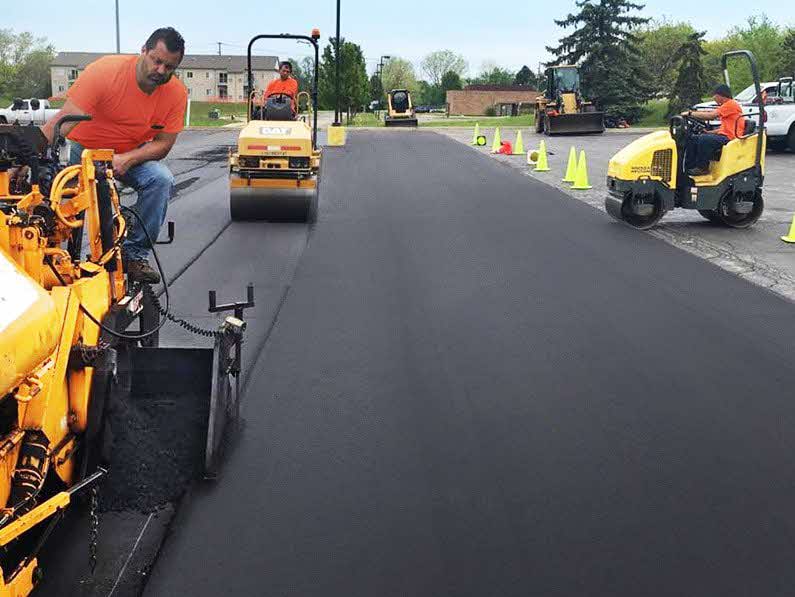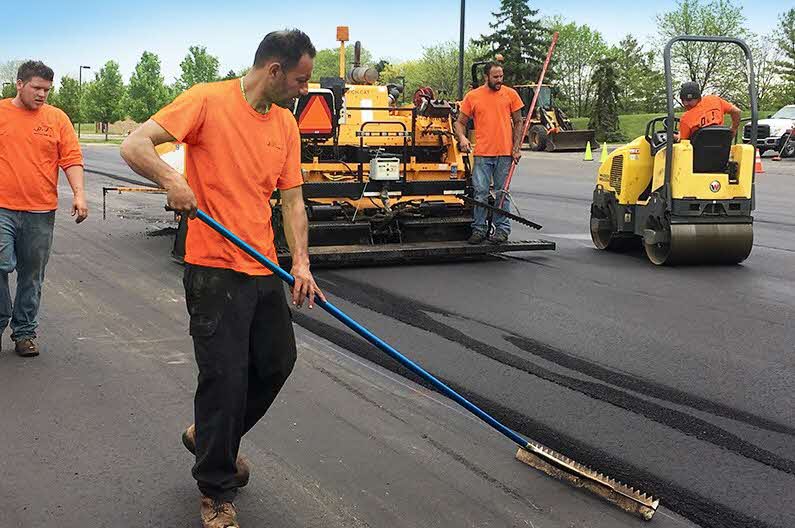Striping Broad Acres Michigan
We Are Locally Owned
& Operated For 36 Years
Contact Us Today!
About Striping
The Comprehensive Guide to Striping Commercial Properties
Striping is not merely an artistic touch but an essential component of commercial properties, especially for parking lots and roadways. However, it’s more than just painting lines on asphalt. This comprehensive guide gives you an insight into why you need adept parking lot striping contractors, the benefits you can reap from quality asphalt striping, and the significant role played by sealing and striping.
What is Striping and Why is it Essential?
Striping is the process of marking surfaces, particularly parking lots, to regulate traffic and create an orderly parking system. Striping and sealing services, such as those offered by asphalt striping companies, help in enhancing safety, meeting compliance standards, and maximizing space use. It is thus prudent to employ professional parking lot line striping and asphalt striping near you for a well-ordered parking area.
The Striping Process
Parking lot paving and striping is a critical aspect of maintaining commercial properties, but it’s not as simple as hiring an asphalt painting company and waiting for the transformation. Every top-notch striping process involves a careful assessment of your parking lot’s current state before embarking on the patching, sealing, and striping. It helps ensure that the sealant adheres properly, guaranteeing that the striping and sealing are long-lasting and affordable.
Identifying Quality Striping and Sealing Services
Identifying an affordable striping and sealing service that delivers quality work can be challenging. However, here are some indicators of high-quality striping services: they are well-versed with local ordinances, they use state-of-art equipment and high-quality paint, and they should have a portfolio of past projects that display their expertise in pavement line striping, parking lot line striping, asphalt striping, and more.
Benefits of High-Quality Parking Lot Striping
There is an array of benefits when you invest in quality sealing and striping services from proficient asphalt striping companies. It ensures your property is ADA compliant, offers an organized parking layout leading to efficient use of space, and provides safety to drivers and pedestrians alike. Quality stripping by the right parking lot striping contractors can also contribute to the curb appeal, attracting more customers and tenants to your commercial property.
Practical Aspects of Striping
Regardless of the size and scope of your commercial property, striping it is an integral aspect of property maintenance. Practical elements include considering the right time for striping, typically during dry weather and low-traffic periods. Working with asphalt striping near me can be the best solution as local asphalt striping companies have a better understanding of regional weather patterns and local traffic.
Asphalt Striping and Maintenance
Pavement marking services extend beyond the initial painting of lines on asphalt. Regular check-ups and quality sealing and striping can help extend the longevity of your commercial lot, saving you significant money in the long run. This is why employing asphalt sealing and striping near me for regular maintenance can be a wise choice.
Conclusion
As this guide illustrates, asphalt striping is a specialized field that requires professional handling. With the right parking lot striping contractors, your commercial property can reap immeasurable benefits ranging from assurance of compliance to safety standards, enhanced curb appeal, and efficient use of space. So, the next time you need asphalt stripping, sealcoating and striping, remember to engage top-rated asphalt striping services in your locality.
In conclusion, whether you are assessing the current state of your commercial property or embarking on a new pavement project, this comprehensive guide has all the information you need to embark with confidence. Make striping and sealing an integral part of your commercial property maintenance for not only meet compliance standards but also boost aesthetic appeal and optimize space.
For a step forward, do get in touch with a professional parking lot striping contractor at your earliest convenience for meticulous striping work aimed at transforming your commercial property into an efficient, safe, and beautiful space.
Contact Us Today for a FREE
Striping Quote






About Broad Acres, Michigan
History
The first settlement on the land that is now Clinton Township was called Gnadenhuetten and was established in 1782 by Rev. David Zeisberg, but closed in 1786. It was organized as “Huron Township” on August 12, 1818, named after what was then known as the Huron River. Because of confusion with another Huron River south of Detroit, on July 17, 1824, the Michigan Territorial Legislature renamed both the township and the river after DeWitt Clinton, the popular governor of New York from 1817 to 1823 who was largely responsible for building the Erie Canal which enabled many settlers to come to Michigan.
Moravian Drive is the township’s oldest road, dating back to the days when Moravian missionaries settled to attempt to convert the local Native Americans.
Geography
Clinton Township is in south-central Macomb County. The city of Mount Clemens, the Macomb county seat, is bordered on three sides by the northeast part of the township.
According to the United States Census Bureau, Clinton Township has a total area of 28.37 square miles (73.5 km), of which 28.03 square miles (72.6 km2) are land and 0.35 square miles (0.91 km), or 1.22%, are water. The Clinton River, for which the community is named, is formed from three branches within the township. It runs east into Harrison Township, where it flows into Lake St. Clair. The township is home to many parks, notably George George Memorial Park.
Communities
There are two unincorporated communities in the township:
- Broad Acres is located in the southeastern portion on M-3/Gratiot Avenue between 15 Mile and Quinn Roads (42°32′57″N 82°54′08″W / 42.54917°N 82.90222°W; Elevation: 610 ft./186 m.).
- Cady is located in the southwestern portion at Utica and Moravian Roads (42°33′37″N 82°57′52″W / 42.56028°N 82.96444°W; Elevation: 614 ft./187 m.). It was founded in 1833 by Chauncey G. Cady. Cady served for a time as township supervisor and was also a member of the state legislature. It had a post office from 1864 until 1906.
Demographics
| Census | Pop. | Note | %± |
|---|---|---|---|
| 2000 | 95,648 | — | |
| 2010 | 96,796 | 1.2% | |
| 2020 | 100,513 | 3.8% | |
| U.S. Decennial Census | |||
2020
| Race / Ethnicity (NH = Non-Hispanic) | Pop 2000 | Pop 2010 | Pop 2020 | % 2000 | % 2010 | % 2020 |
|---|---|---|---|---|---|---|
| White alone (NH) | 86,042 | 78,062 | 72,926 | 89.96% | 80.65% | 72.55% |
| Black or African American alone (NH) | 4,424 | 12,509 | 17,428 | 4.63% | 12.92% | 17.34% |
| Native American or Alaska Native alone (NH) | 223 | 230 | 192 | 0.23% | 0.24% | 0.19% |
| Asian alone (NH) | 1,597 | 1,723 | 2,170 | 1.67% | 1.78% | 2.16% |
| Pacific Islander alone (NH) | 11 | 29 | 19 | 0.01% | 0.03% | 0.02% |
| Other race alone (NH) | 82 | 82 | 335 | 0.09% | 0.08% | 0.33% |
| Mixed race or Multiracial (NH) | 1,605 | 1,871 | 4,449 | 1.68% | 1.93% | 4.43% |
| Hispanic or Latino (any race) | 1,664 | 2,290 | 2,994 | 1.74% | 2.37% | 2.98% |
| Total | 95,648 | 96,796 | 100,513 | 100.00% | 100.00% | 100.00% |
2010
As of the census of 2010, there were 96,796 people, 42,036 households, and 25,678 families residing in the township. The racial makeup of the township was 82.08% White, 13.04% African American, 0.28% Native American, 1.79% Asian, 0.03% Pacific Islander, 0.61% from other races, and 2.17% from two or more races. Hispanic or Latino people of any race were 2.37% of the population. By 2016, the township’s population was estimated to have surpassed 100,000.
In 2000, there were 40,299 households, out of which 28.1% had children under the age of 18 living with them, 48.7% were married couples living together, 10.9% had a female householder with no husband present, and 36.6% were non-families. 30.8% of all households were made up of individuals, and 10.8% had someone living alone who was 65 years of age or older. The average household size was 2.35 and the average family size was 2.98.
In 2000, 22.4% of the population was under the age of 18, 9.1% from 18 to 24, 30.9% from 25 to 44, 23.4% from 45 to 64, and 14.3% who were 65 years of age or older. The median age was 37 years. For every 100 females, there were 92.4 males. For every 100 females age 18 and over, there were 88.5 males. The median income for a household in the township was $50,067, and the median income for a family was $61,497. Males had a median income of $48,818 versus $29,847 for females. The per capita income for the township was $25,758. About 4.2% of families and 5.8% of the population were below the poverty line, including 7.4% of those under age 18 and 6.8% of those age 65 or over.
Education
Chippewa Valley Schools, with two high schools (Chippewa Valley and Dakota), and Clintondale Community Schools, with one high school (Clintondale High), are the primary school districts in the township. Other school districts that operate within Clinton Township are L’Anse Creuse, Fraser, and Mount Clemens.
Contact Us Today for a FREE
Striping Quote
Our Striping services are available in Broad Acres as well as all of Macomb County.
Our dedicated team at D&J Contracting Inc is at-the-ready to provide you with great customer service and first class Striping services. Reach out to us at (586) 954-0008 to discuss your Striping needs today!